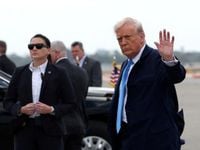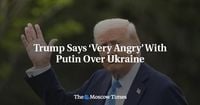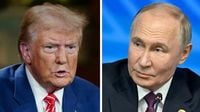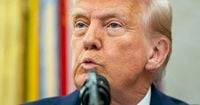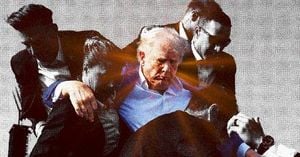United States President Donald Trump has expressed his frustration with Russian President Vladimir Putin, threatening to impose secondary sanctions on Russian oil if Moscow does not agree to a ceasefire to end its ongoing war in Ukraine. In an interview with NBC on March 30, 2025, Trump stated he is “p***** off” at Putin, particularly after the Russian leader suggested that a transitional government backed by the United Nations should replace Ukrainian President Volodymyr Zelenskyy.
Trump emphasized that if he and Putin cannot reach an agreement to halt the bloodshed in Ukraine, he will consider imposing a 25 percent tariff on all oil coming from Russia. “If Russia and I are unable to make a deal on stopping the bloodshed in Ukraine, and if I think it was Russia’s fault – which it might not be – but if I think it was Russia’s fault, I am going to put secondary tariffs on all oil coming out of Russia,” he said during the NBC interview.
This threat of tariffs comes less than a week after Trump’s administration imposed a similar 25 percent tariff on U.S. imports from countries purchasing oil or gas from Venezuela. Such measures could significantly impact Russia’s key customers, including China and India.
The tensions between Trump and Putin have escalated following Putin's comments about Zelenskyy, which Trump found unacceptable. The U.S. President noted that he plans to speak with Putin this week to address these issues. Trump’s remarks reflect a notable shift in tone, as he previously maintained a more conciliatory approach toward Russia since returning to office.
On the weekend of March 29-30, Trump engaged in discussions with Finnish President Alexander Stubb, who advocated for establishing a deadline for a ceasefire. Stubb suggested April 20, 2025, as a potential date for this ceasefire, which would mark three months since Trump resumed his presidency. Stubb emphasized the need for a firm deadline, stating, “If by then it’s not accepted or is broken by Russia, there needs to be consequences, including maximum sanctions.”
Stubb's comments align with growing frustration in Washington regarding Russia's perceived stalling tactics. He noted that while the U.S., Ukraine, and Europe have agreed on the concept of a ceasefire, Russia has not yet complied. “The overall ceasefire has been agreed by the United States, by Ukraine and by Europe, but not by Russia,” he said.
Trump’s anger was further fueled by Putin's recent remarks questioning Zelenskyy’s legitimacy as president, which have been echoed by Trump himself in the past. Zelenskyy’s term officially ended in May 2024, and under Ukrainian law, elections cannot be held during martial law, which has been in effect since the onset of the Russian invasion in 2022.
In his NBC interview, Trump reiterated his belief that he maintains a “very good relationship” with Putin, despite the current tensions. He stated, “The anger dissipates quickly … if he does the right thing.” However, the situation on the ground remains dire, with continued Russian attacks on Ukrainian cities, including Kharkiv, where recent strikes have resulted in casualties.
As the conflict continues, Zelenskyy has urged for increased pressure on Russia to agree to a ceasefire. In a recent address, he remarked, “For too long now, America's proposal for an unconditional ceasefire has been on the table without an adequate response from Russia.”
Trump's administration has faced criticism for its handling of the conflict, particularly regarding its approach to Zelenskyy and Ukraine's sovereignty. The U.S. President has previously labeled Zelenskyy a “dictator” and has expressed skepticism about Ukraine’s aspirations for NATO membership.
In a separate conversation, Trump indicated he was also considering imposing secondary tariffs on Iran, further escalating tensions in the region. “There will be bombing if the country doesn’t make a peace deal,” he warned, signaling a tough stance on multiple fronts.
As the international community watches closely, the pressure mounts on both Trump and Putin to navigate this complex geopolitical landscape. The stakes are high, not only for Ukraine but also for global energy markets and international relations.
With the looming deadline for a ceasefire and the potential for new sanctions, the coming weeks will be critical in determining the trajectory of U.S.-Russia relations and the future of the conflict in Ukraine.
Trump’s administration has been criticized for its fluctuating stance on Russia, with some arguing that the recent threats could lead to further escalation rather than resolution. As the situation develops, it remains to be seen whether diplomatic efforts will yield a lasting peace or if tensions will continue to rise.
In conclusion, the ongoing conflict in Ukraine, coupled with Trump's threats of tariffs and sanctions, highlights the complexities of modern diplomacy and the challenges faced by leaders in seeking a resolution.

